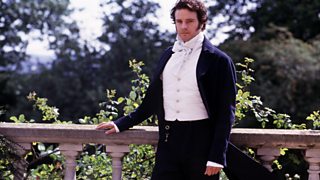What can literature teach us about sexual consent?
In the wake of the #MeToo movement, sexual consent is a hot topic. What should good sexual consent look, sound and feel like?
In a new two-part programme, The Art of Intimacy, author Eimear McBride examines the ways that writers have depicted the moments just before sex, when consent is still molten and evolving. She asks, where in our literature can we find good examples of this kind of intimacy? And what can literature teach us about consent?

-
![]()
The Art of Intimacy
Our age is confused about sexual consent - what should it look, sound and feel like?
1. Harassment in the workplace (In Pamela by Samuel Richardson)
Samuel Richardson’s 17th century novel is a story about a young lady’s maid called Pamela - a teenager who’s repeatedly harassed by her employer, Mr B, who is desperate to sleep with her. But Pamela says no to him, over and over again:
He put his arm round me, and his other hand on my Neck; which made me more angry and bold; and he said, ‘What then am I?’ – ‘Why, said I,’ (struggling from him, and in a great Passion) ‘to be sure you are Lucifer himself in the Shape of my Master.
Eimear meets Professor Judith Hawley to discuss the significance of this novel, which tackles head on the issue of consent: “A powerful male figure who controls the life of a young woman is not uncommon in cases of rape and sexual harassment,” says Judith. “It’s harassment in the workplace.” And what is remarkable is that the young woman, in a much less powerful position, resists the man and manages to convert him. Pamela actually marries her boss so that “eventually, when they do get together, they’re on a much more equal footing.”
The idea that a woman’s “no” mattered – that it was sincere – was an important message at the time. And the idea that a man had to work hard to be worthy of a “yes” went on to influence many of our best-loved authors, including Jane Austen.
“What Richardson does” says Judith, is say “that a woman has the right to choose. She has the right to choose who handles her body.”
-
![]()
The New Age of Consent: Crossing the Line
Actress and broadcaster Jameela Jamil tackles the explosive conversation around sexual assault.
2. Good consent (In Lady Chatterley鈥檚 Lover by D.H. Lawrence)
Eimear meets Dr Catherine Brown to discuss D. H. Lawrence who, more than any other author, staked his reputation on the writing of sex.
She believes he is hugely interesting on the issue of consent. “His female readers felt that he understood their perspective,” says Catherine. Although Lady Chatterley’s Lover denotes the man – her gamekeeper lover – it is really about Lady Chatterley and her feelings.
There’s an example, says Catherine, where the couple have had a break from each other (admittedly only over the course of a lunchtime) and then Lady Chatterley decides to return to Oliver. They didn’t have sex before lunch but she has decided now that she does want it after all:
‘Shall us go I’ th’ ‘ut?’ he asked.
‘Do you want me?’ she asked, in a sort of mistrust.
‘Ay, if you want to come.’
“That ‘if’ is extraordinary,” says Catherine. “He’s saying yes I want you, if you want me. And if you think about it, that is what should underlie absolutely all sexual activity.” Of course it’s not always vocalised like that in real life, she says, but nonetheless, Lawrence has got the basics right.

3. Appropriate behaviour (In As You Like it by William Shakespeare)
In Shakespeare’s play As You Like It, consent is even imbedded in the title.
In Shakespeare鈥檚 play As You Like It, consent is even imbedded in the title.
Professor Emma Smith talks through the great moment when Rosalind, dressed as the male Ganymede, is addressing Orlando and encouraging him to woo her as if she were Rosalind:
Come, woo me, woo me, for now I am in a holiday
humour and like enough to consent. What would you
say to me now, an I were your very very Rosalind?
Orlando gives a very interesting answer: “I would kiss before I spoke.” And Rosalind responds by letting him know that’s not the correct thing to do at all:
Nay, you were better speak first, and when you were
gravelled for lack of matter, you might take
occasion to kiss.
She is saying, talk first and if the talking runs out then perhaps try a kiss – but not before.
Part of what is going on in this scene, Emma says, is teaching about what’s appropriate behaviour. These plays by Shakespeare are really aimed at young men, and they’re a sort of conduct book about how to behave properly towards women. Shakespeare is saying ask, don’t take.
-
![]()
Books and Authors podcast
Subscribe to the podcast featuring Open Book and A Good Read.
4. Consent as a continuous and evolving conversation (In The Platonic Blow by W.H. Auden)
In this erotic poem, disowned by Auden for many years, the protagonist invites a stranger to his room:
Our eyes met. I felt sick. My knees turned weak.
I couldn't move. I didn't know what to say.
In a blur I heard words, myself like a stranger speak,
‘Will you come to my room?’ Then a husky voice, ‘O.K.’
This query is the first of many in the poem with the protagonist asking a series of increasingly explicit questions as he performs a sexual act on the stranger.
Poet Andrew McMillan believes that “queerness is much more in touch with the idea that every person’s sexuality is unique to them” and that on one level the questioning “is that idea of trying to build a unique rapport with the person that you’re with at that moment, trying to make sure that they’re comfortable, trying to find out what it is that they want.”
But it also demonstrates that consent is not something you get once, but a continuous and evolving conversation: “Each time we encounter someone – for half an hour, for a lifetime – each day requires that re-establishing and re-questioning and resettling of what that relationship, both physical and emotional, is going to be.”
Just how rich was Mr Darcy?

The male love interest of 'Pride and Prejudice' is supposed to be fabulously wealthy with an income £10,000 a year. 200 years later, it's not clear how remarkable it really is.
5. Accountability (In Twilight by Stephenie Meyer)
In the fantasy romance series, Twilight, high-school student Bella Swan meets and falls hopelessly in love with Edward, a handsome vampire (who thankfully doesn’t drink blood). Consent, and Bella’s virginity, lie at the heart of the story.
But here is an example of a book that could be considered to promote a harmful, conservative, and ultimately abusive, message around sex. Not only must Bella marry Edward before they can make love – enforcing ideas of abstinence – but she must also be prepared to die. Edward repeatedly warns her that sex will be dangerous: the intensity of the act could cause him to be overcome with violence and accidentally kill her. Does this enforce the stereotype that, once aroused, a man is unable to control his physical actions and cannot be held accountable?
As Guardian journalist Tanya Gold states, “Twilight is not feminist: it’s female masochism.” Bella consents, but it is to a physically abusive relationship, and one that will ultimately kill her.

6. Interpretation (In The Wolf Border by Sarah Hall)
In The Wolf Border, two animal specialists – one of them pregnant with another man’s child – are about to make love. Consent is given, and yet there is no explicit question. It’s just a familiar kind of dance:
He kisses her, lifts her slightly. A slow, plush mouth, not quite what she expected… He draws back.
Are we drinking this tea? he asks.
No, probably not.
He kisses her again, less gentle, a kind of deliberate gambit. They do not take their time – whatever has been set up has been done so with licence.
“The tea is absolutely a type of pretext,” says author Sarah Hall - the man’s question has nothing to do with their drinks. It is simply a way of finding out, without asking directly, whether they both want what is about the happen. We come up with these rituals, like having a glass of wine, in order to interpret each other’s behaviour and feelings. Rejection is painful, Sarah says, so it’s about “coming up with a system where you are gleaning information in a very personal way, without putting yourself on the line.”
-
![]()
The New Age of Consent: Re-writing the Rules
Actress and broadcaster Jameela Jamil determines what consent should look like in a modern, digital world.
More from Radio 4
-
![]()
The Art of Intimacy
Novelist Eimear McBride asks how writers, artists and performers have depicted intimate conversations about sexual consent.
-
![]()
Nine secrets to improve your relationships
Practical tips for helping the important relationships in your life run smoothly.
-
![]()
Five Great 'Bromances' in Classic Literature
A handful of classic novels with a meaningful male friendship at their heart.
-
![]()
Six reasons why P.G. Wodehouse is Stephen Fry鈥檚 hero
All about the writer who Stephen Fry says simply cheers him up like no one else.






